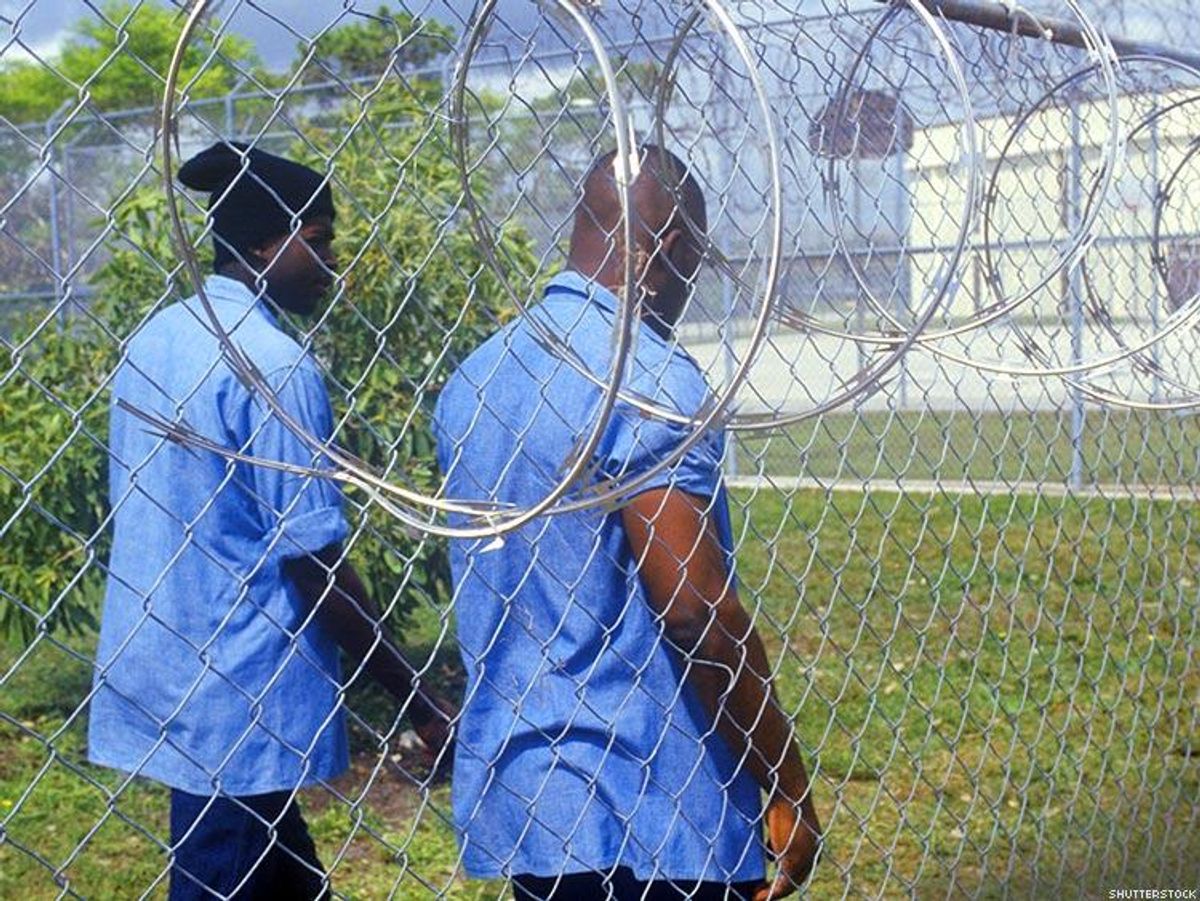In all 50 states, sex is not allowed in prison and jails. In every prison and jail, sex is happening.
Even knowing that fact, there are only two states that make condoms available to prisoners. One, California, just made that change this year (both California and Vermont, the other state, still ban sex even while offering protection to inmates). The issue is of concern to everyone in the prison system -- at the very least -- but no group is more affected by the dearth of condoms and HIV information than gay and bi African-American men. As we've written about all week, their rates of HIV are astronomical, with predictions that six in 10 black queer men will contract the virus by age 40. On top of that, African-Americans are incarcerated at six times the rate of whites and, as of 2001, one in six black men had served time in jail.
There are a myriad of explanations why African-Americans, especially men, constitute such a high number of prisoners, inlcuding socio-economic disparities and systemic racism. Just like with the incarceration numbers, there is no easy answer for why so many of those black men in prisons have HIV; among jail populations, African-American men are five times as likely as white men and twice as likely as Hispanic/Latino men to be diagnosed with HIV.
So while condoms are overflowing from nightclub bathrooms and handed out like candy at Gay Pride festivals, in the places they may be most needed, they're nearly impossible to find.
"There's a sense among some administrators that providing condoms legitimizes a prohibited practice," says Gabriel Eber, senior staff counsel for the American Civil Liberties Union's National Prison Project. "Sexual relations are a reality in prisons and jails in the United States. We bury our heads in the sand when we prohibit condoms and other measures that save lives."
The fear of sending a contradictory message is only one reason prisons ban condoms; some officials worry that prisoners will use them to hide contraband or even to pitch bodily fluids at correction officers. But in San Francisco, which has allowed condoms for years in city jails it operates, the only unsanctioned use of them has been as pillows or hair ties.
Others worry that condoms will encourage rape, though that hasn't come to pass in Vermont. After all, rapists rarely can be convinced to use protection or have the time to put on a condom. That state has been distributing them since the early days of the AIDS epidemic of the 1980s, via one-on-one visits with nurses, which help keep distribution confidential. San Francisco County Jail No. 4 keeps condoms in an out-of-the-way metal box, where they're dispensed in cardboard packets. A similar set-up will be implemented throughout California's state prisons.
Meanwhile, in jails without condoms, reports indicate that prisoners make due with plastic wrap or even plastic bags secured with rubber bands. With one in seven people with HIV passing through prison, that equals a lot of dangerous sex.
"Our point of view is that public health practices shouldn't be abandoned at the jail room door," Eber says. "People shouldn't be denied measures that keep them safe, healthy, and even alive."
The city and county jails that do allow condoms are "clustered around the coasts," Eber says, though he's reluctant to say that resistance to the practice is split along geographical lines. San Francisco Sheriff Ross Mirkarimi was frank with Al-Jazeera recently, saying that homophobia is clearly at play when it comes to resisting distribution.
Anti-LGBT sentiment also seeps into treatment of incarcerated transgender people, who are often placed in prisons that don't correspond with their gender identity, as well as resistance to sex education and PrEP, and sometimes spotty distribution of HIV meds. While the ACLU's Prison Project pushes for prison reform through litigation, there is little in the way of organized advocacy for condoms in prisons. That's especially unfortunate, since the repercussions of unsafe jail sex spread far beyond prison walls, especially for black men, who have so many cards stacked against them when it comes to HIV.
"Preventing the spread of HIV and other diseases in prison makes good public health policy and good public policy in general," Eber says. "The vast majority of people in prison are coming out and going back to the community, and it's in everybody's best interest that they come out healthy. People who are prisoners today are going to be our neighbors tomorrow."
The Advocate's #6in10MenIf nothing changes, 6 in 10 black gay and bisexual men in the United States will have HIV by the time they are 40 years old. Learn more about this crisis in The Advocate's series #6in10Men: https://www.advocate.com/6in10men
Posted by The Advocate magazine on Friday, September 25, 2015






































































Viral post saying Republicans 'have two daddies now' has MAGA hot and bothered